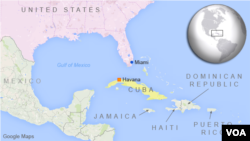Seoul's newly forged diplomatic ties with Havana are a diplomatic setback for North Korea, which views Cuba as a brother country, according to analysts.
North Korea has had diplomatic relations with Cuba since 1960, and Cuba maintains an embassy in Pyongyang.
South Korea did not have diplomatic ties with Cuba for 65 years, but the South Korean Foreign Ministry announced it agreed with Cuba to set up ambassador-level diplomatic relations between the two when their respective representatives to the United Nations met in New York on Feb. 14.
North Korea has not made a public statement about South Korea's diplomatic ties with Cuba.
"The establishment of full diplomatic relations between the ROK and Cuba is somewhat of a psychological and symbolic setback for the DPRK," said Evans Revere, a former State Department official with extensive experience negotiating with North Korea.
South Korea's official name is the Republic of Korea (ROK). North Korea is officially the Democratic People's Republic of Korea (DPRK).
"Seoul's motivation was to regularize ties with a North Korean ally and achieve a diplomatic and political success in its ongoing competition with the DPRK," Revere said via email on Saturday.
"Cuba's motivation was to try to improve its stagnant economy and improve the lives of its people," added Revere, a nonresident senior fellow at the Brookings Institution's Center for East Asia Policy Studies.
Terence Roehrig, professor of national security affairs and a Korea expert at the U.S. Naval War College, said via email on Monday that establishing ties with Cuba is "a political win for Seoul in its competition with the North."
He said that the two countries' economic relations will give Seoul expanded access to Cuba's mineral resources while Havana will obtain increased trade and investment from South Korea.
Robert Rapson, who served as charge d'affaires and deputy chief of mission at the U.S. Embassy in Seoul from 2018 to 2021, said via email on Friday the Seoul-Havana ties probably do not cause Pyongyang "so much pain" diplomatically because it has strengthened ties with Russia and looks ahead to a possible meeting with Japan.
Although Seoul and Havana have engaged in cultural exchanges, the newly established ties will aid economic cooperation that will support South Korean companies' entry into the Cuban market, said the South Korean Foreign Ministry in a Feb. 14 statement.
South Korea imported more than $7 million worth of goods from Cuba while exporting $14 million in 2022, according to the Foreign Ministry.
Among items that South Korea imported in 2022, copper accounted for $3.28 million, chemical products $2.13 million, and tobacco products $1.03 million, according to UN COMTRADE database, cited by Trading Economics, which compiles economic databases, indicators and indexes for 196 countries.
The South Korean presidential office said Cuba could emerge as a new market if the bilateral economic ties develop and if the U.S. relaxes the trade embargo imposed on Cuba in 1962.
The U.S. severed its diplomatic relations with Cuba in 1961 after Fidel Castro came to power in 1959. Washington officially restored diplomatic ties with Havana in 2015, but some U.S. policies were reversed in 2017.
Revere said Washington has reacted in a "very low-key manner" because of the sensitivity of Cuba as a domestic political issue in the United States.
However, he continued, the U.S. is probably "quite pleased with ROK-Cuba normalization, especially since Washington has also been trying to improve ties with the island. Going forward, the U.S. and the ROK will need to ensure that they coordinate their respective approaches on Cuba."
South Korea has been working over the years to improve ties with the socialist country whose government bears more resemblance to North Korea's than its own. Havana's political power is wholly vested in its Cuban Communist Party, much like Pyongyang's ruling Workers' Party of Korea.
Seoul's "bold and smart decision" in establishing ties with Havana could expose the Cuban government and people to South Korea's liberal democracy, said Joseph DeTrani, the special envoy for Six Party denuclearization talks with North Korea during the George W. Bush administration.
"North Korea may feel threatened diplomatically by this move," DeTrani said via email on Friday.
The South Korean Foreign Ministry said several cultural exchanges and people-to-people contacts between the two countries have played a role in the normalization of the diplomatic relations.
Among them are a Cuban film festival held in Seoul in 2022 and South Korean movies featured at an international film festival in Havana in December.
The Foreign Ministry also said ArtCor, a fan club of approximately 10,000 members in Cuba devoted to Korean popular culture, contributed to the opening of the diplomatic ties.
Approximately 14,000 South Koreans visited Cuba prior to the COVID-19 pandemic, and about 1,100 ethnic South Koreans live in Cuba, according to the South Korean Foreign Ministry.













